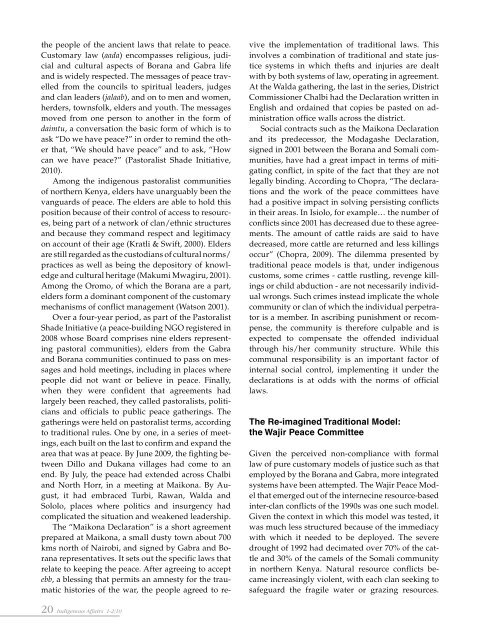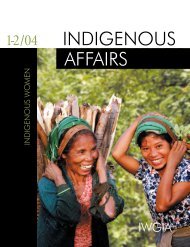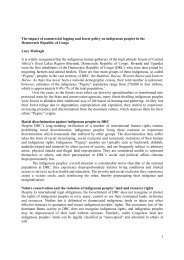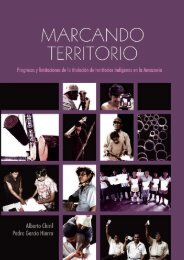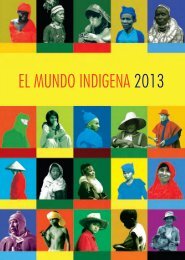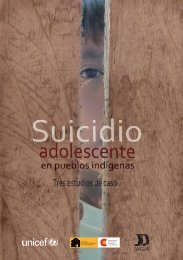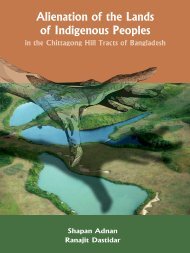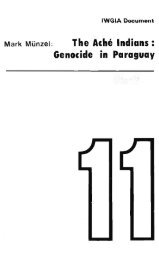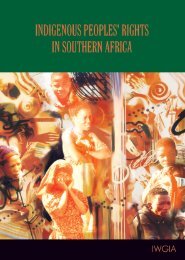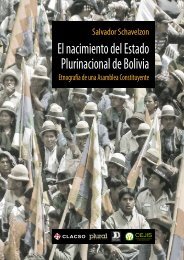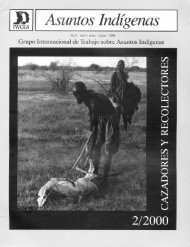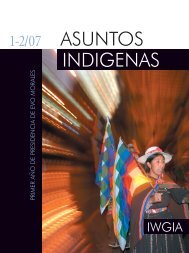Download (pdf) - iwgia
Download (pdf) - iwgia
Download (pdf) - iwgia
Create successful ePaper yourself
Turn your PDF publications into a flip-book with our unique Google optimized e-Paper software.
the people of the ancient laws that relate to peace.<br />
Customary law (aada) encompasses religious, judicial<br />
and cultural aspects of Borana and Gabra life<br />
and is widely respected. The messages of peace travelled<br />
from the councils to spiritual leaders, judges<br />
and clan leaders (jalaab), and on to men and women,<br />
herders, townsfolk, elders and youth. The messages<br />
moved from one person to another in the form of<br />
daimtu, a conversation the basic form of which is to<br />
ask “Do we have peace?” in order to remind the other<br />
that, “We should have peace” and to ask, “How<br />
can we have peace?” (Pastoralist Shade Initiative,<br />
2010).<br />
Among the indigenous pastoralist communities<br />
of northern Kenya, elders have unarguably been the<br />
vanguards of peace. The elders are able to hold this<br />
position because of their control of access to resources,<br />
being part of a network of clan/ethnic structures<br />
and because they command respect and legitimacy<br />
on account of their age (Kratli & Swift, 2000). Elders<br />
are still regarded as the custodians of cultural norms/<br />
practices as well as being the depository of knowledge<br />
and cultural heritage (Makumi Mwagiru, 2001).<br />
Among the Oromo, of which the Borana are a part,<br />
elders form a dominant component of the customary<br />
mechanisms of conflict management (Watson 2001).<br />
Over a four-year period, as part of the Pastoralist<br />
Shade Initiative (a peace-building NGO registered in<br />
2008 whose Board comprises nine elders representing<br />
pastoral communities), elders from the Gabra<br />
and Borana communities continued to pass on messages<br />
and hold meetings, including in places where<br />
people did not want or believe in peace. Finally,<br />
when they were confident that agreements had<br />
largely been reached, they called pastoralists, politicians<br />
and officials to public peace gatherings. The<br />
gatherings were held on pastoralist terms, according<br />
to traditional rules. One by one, in a series of meetings,<br />
each built on the last to confirm and expand the<br />
area that was at peace. By June 2009, the fighting between<br />
Dillo and Dukana villages had come to an<br />
end. By July, the peace had extended across Chalbi<br />
and North Horr, in a meeting at Maikona. By August,<br />
it had embraced Turbi, Rawan, Walda and<br />
Sololo, places where politics and insurgency had<br />
complicated the situation and weakened leadership.<br />
The “Maikona Declaration” is a short agreement<br />
prepared at Maikona, a small dusty town about 700<br />
kms north of Nairobi, and signed by Gabra and Borana<br />
representatives. It sets out the specific laws that<br />
relate to keeping the peace. After agreeing to accept<br />
ebb, a blessing that permits an amnesty for the traumatic<br />
histories of the war, the people agreed to revive<br />
the implementation of traditional laws. This<br />
involves a combination of traditional and state justice<br />
systems in which thefts and injuries are dealt<br />
with by both systems of law, operating in agreement.<br />
At the Walda gathering, the last in the series, District<br />
Commissioner Chalbi had the Declaration written in<br />
English and ordained that copies be pasted on administration<br />
office walls across the district.<br />
Social contracts such as the Maikona Declaration<br />
and its predecessor, the Modagashe Declaration,<br />
signed in 2001 between the Borana and Somali communities,<br />
have had a great impact in terms of mitigating<br />
conflict, in spite of the fact that they are not<br />
legally binding. According to Chopra, “The declarations<br />
and the work of the peace committees have<br />
had a positive impact in solving persisting conflicts<br />
in their areas. In Isiolo, for example… the number of<br />
conflicts since 2001 has decreased due to these agreements.<br />
The amount of cattle raids are said to have<br />
decreased, more cattle are returned and less killings<br />
occur” (Chopra, 2009). The dilemma presented by<br />
traditional peace models is that, under indigenous<br />
customs, some crimes - cattle rustling, revenge killings<br />
or child abduction - are not necessarily individual<br />
wrongs. Such crimes instead implicate the whole<br />
community or clan of which the individual perpetrator<br />
is a member. In ascribing punishment or recompense,<br />
the community is therefore culpable and is<br />
expected to compensate the offended individual<br />
through his/her community structure. While this<br />
communal responsibility is an important factor of<br />
internal social control, implementing it under the<br />
declarations is at odds with the norms of official<br />
laws.<br />
The Re-imagined Traditional Model:<br />
the Wajir Peace Committee<br />
Given the perceived non-compliance with formal<br />
law of pure customary models of justice such as that<br />
employed by the Borana and Gabra, more integrated<br />
systems have been attempted. The Wajir Peace Model<br />
that emerged out of the internecine resource-based<br />
inter-clan conflicts of the 1990s was one such model.<br />
Given the context in which this model was tested, it<br />
was much less structured because of the immediacy<br />
with which it needed to be deployed. The severe<br />
drought of 1992 had decimated over 70% of the cattle<br />
and 30% of the camels of the Somali community<br />
in northern Kenya. Natural resource conflicts became<br />
increasingly violent, with each clan seeking to<br />
safeguard the fragile water or grazing resources.<br />
20 Indigenous Affairs 1-2/10


